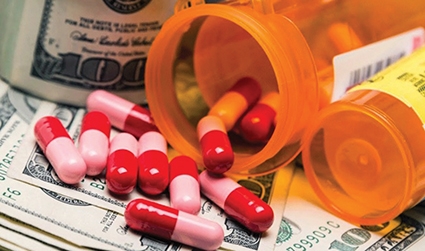Russian MoH Asked to Clear the Russian Market of Ukrainian Meds
The Russian Ministry of Health was asked to investigate the situation with Ukrainian medicine on the Russian market, with Chairman of the State Duma Committee on Economic Policy, Industry, Innovative Development and Entrepreneurship, Sergey Zhigarev, sending an appeal on the issue to parliament.
The move came following a statement by Chetvergov (the head of Pharma-Management, a Russian pharmaceutical company), which seems to suggest that Ukraine is literally leading Russia into a pharmaceutical war.
"In recent years, despite the extremely strained relations between the two countries, Ukrainian medicine is being actively imported into Russia. However, their manufacturers are dumping the price (forced to do so by the current level of the economy in Ukraine and the lack of other markets),” Chetvergov says. “This prevents Russian companies, including ours, from investing in the development of technologies for such drugs.”
Chetvergov goes on to bring specific examples. There is an original drug for the treatment of liver "Essentiale H" (produced by Sanofi, a global pharmaceutical company with headquarters in Paris) and there are generics - "Essential phospholipids" (Chetvergov’s company Binergiya, Russia), Phosphogliv (Pharmstandard, Russia), "Lesfal" (Farmak, Ukraine), and others. According to Chetvergov, before the arrival of the Ukrainians on the Russian market, "the demand on the hepatic group was already down.”
He cites two more examples - Ukrainian "Artifrin" (a dental anesthetic) and Ukrainian "Vitakson" (vitamin complex). They have also, he says, displaced the Russian manufacturers from the Russian market, in particular Chetvergov’s company Binergiya.
Chetvergov asks that "an aggressive economic policy be taken against Ukrainian medicines," and proposed "prohibiting the acquisition of goods of Ukrainian production."
Market experts say that while Ukrainian producers may have interfered with Binergiya’s market, in general, their presence is not dangerous to Russia.
According to the agency DSM Group, which monitors the pharmaceutical market, the share of Ukrainian products on the Russian market is now less than 1%. And even in 2013, before the revolutionary events in Maidan, the share of Ukrainian medicine in Russia was little more - 1.4%.
In fact, the volume of Ukrainian products on the Russian market is shrinking from year to year. “On average, about 24 million packages of Ukrainian drugs, worth 2.8 billion Rubles, are sold in Russia every year,” says CEO of DSM Group, Sergey Shuljak.
The most popular Ukrainian pharmaceutical products at present are "Corvalol" (a sedative), "Urolesan" (an antispasmodic), "Guttasil" (a laxative), "Chlorophillipt '(anti-worm medicine) and "Pinosol "(nasal drops) while the top-5 Ukrainian manufacturers on the Russian market are: Farmak JSC, Pharma Start LLC, Halychpharm JSC, Health of FC Ltd, and Kyivmedpreparat JSC.
DSM Group also analyzed the Russian list of VED (Vital and Essential drugs, whose prices are regulated by the State). In its almost 30 thousand SKU (Stock Keeping Unit), only 279 SKU is of Ukrainian origin.
In addition, it is highlighted that public preference should be given to domestic producers. When an application is filled in by at least two suppliers of the Eurasian Economic Union, companies from other countries are not allowed to participate. The structure of the EAEU includes Russia, Belarus, Armenia, Kazakhstan and Kyrgyzstan - Ukraine is not there.
“The healthcare system should be kept out of politics,” says the director of the Institute of Health Economics School, Larisa Popovich. “What Ukraine produces does not concern us. They can make anything, but our position has to be correct. Patients should not remain without drugs, and no political debate should interfere with the system of medicinal treatment of citizens.”
Dimitri Dolaberidze











